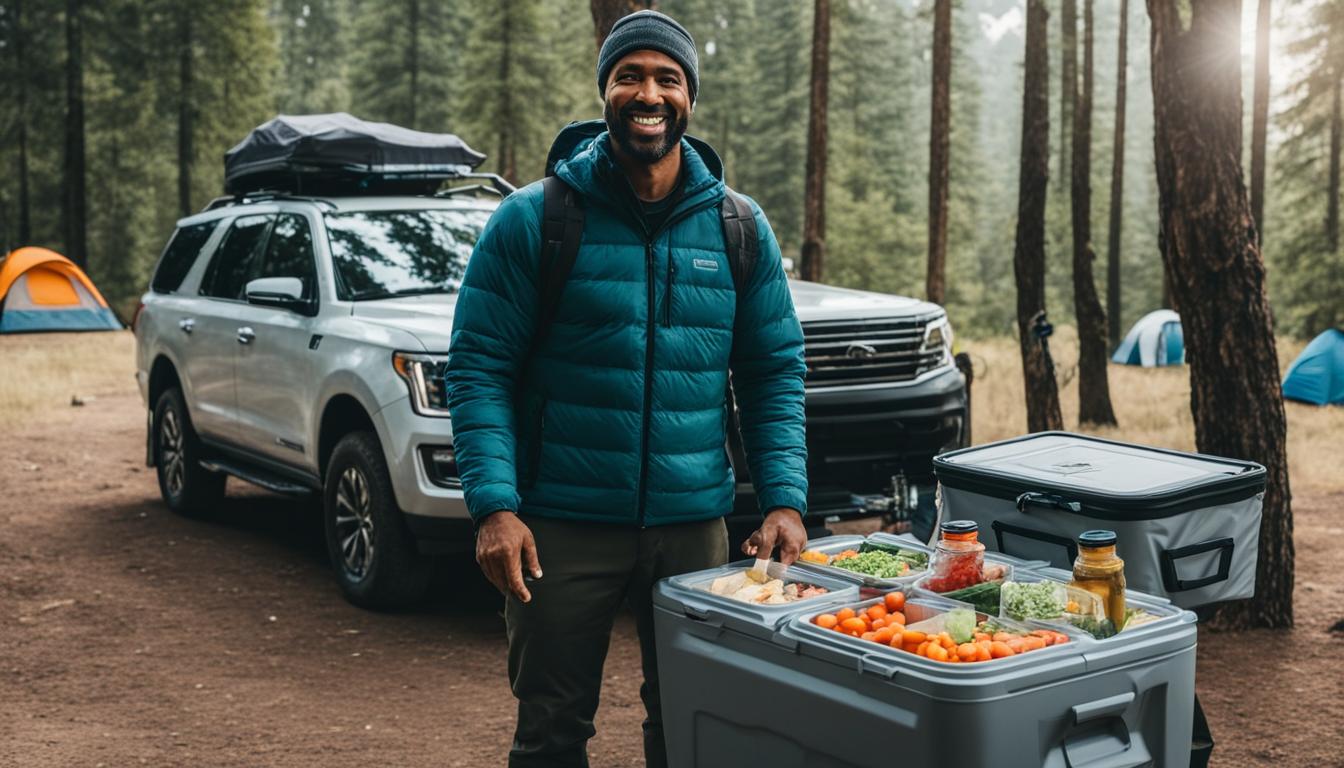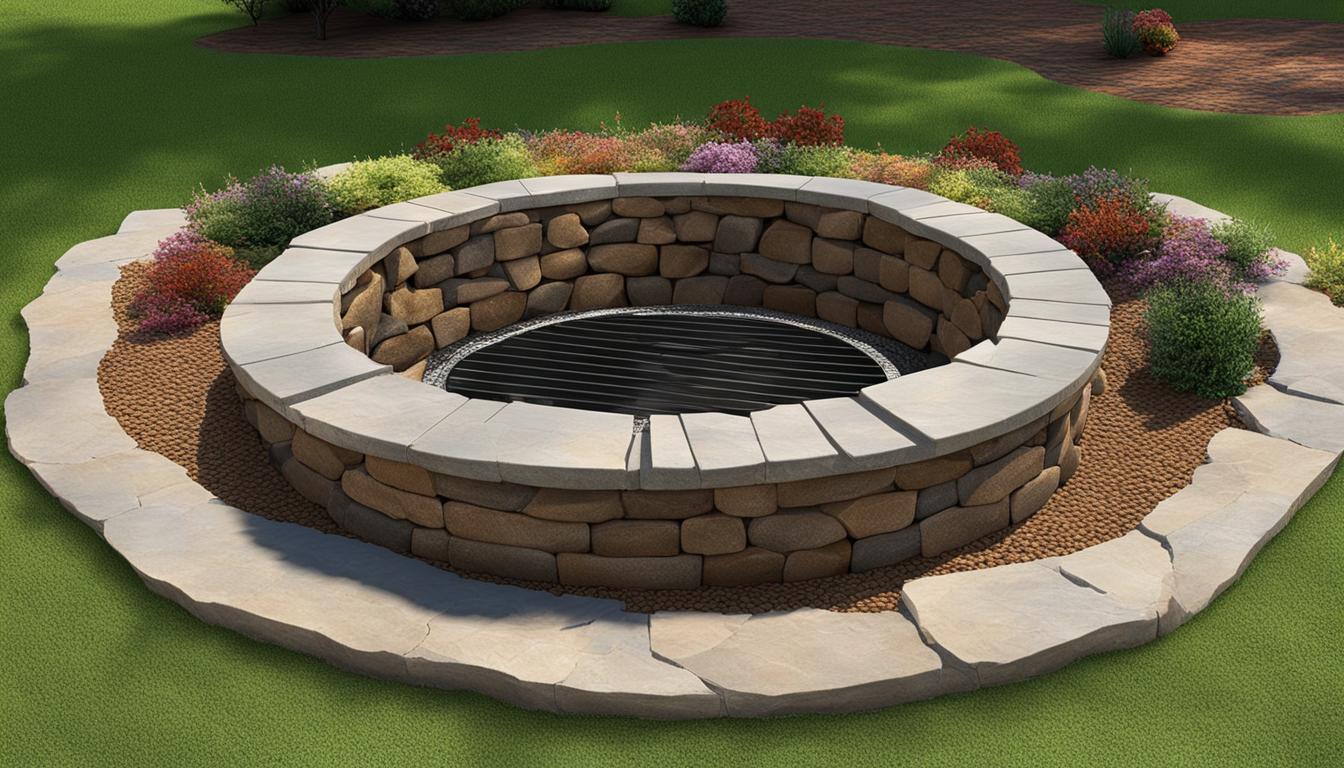When I go camping, I always make sure to pack the right gear, plan exciting activities, and most importantly, have effective food storage techniques. Proper food storage is essential for freshness, safety, and ensuring a delightful culinary experience during your outdoor adventure.
In this article, I will share valuable camping food storage tips to help you make the most of your trip. Learn how to store food when camping, the best ways to keep it fresh, and expert tricks for organizing your camp kitchen.
Whether you’re a seasoned camper or a first-timer, these tips and tricks will ensure your meals are delicious, your food is safe, and your camping experience is unforgettable.
Key Takeaways:
- Invest in sturdy airtight and waterproof camping food storage containers.
- Use camping food preservation techniques like vacuum sealing or dehydrating.
- Follow food safety guidelines to prevent foodborne illnesses.
- Consider long-term food storage options for extended camping trips.
- Explore camping food storage hacks for creative solutions.
Best Ways to Store Food While Camping
Proper food storage is crucial for a successful camping trip. When exploring the great outdoors, it’s important to invest in high-quality camping food storage containers that are both airtight and waterproof. These containers will effectively keep your food fresh and protect it from any leaks or contamination.
One of the best options for camping food storage containers is the Yeti Tundra Cooler. This durable cooler is known for its exceptional insulation capabilities and can keep your food chilled for days. It’s also airtight, ensuring that your perishable items stay fresh throughout your camping adventure.
Another effective method for food preservation while camping is vacuum sealing. Vacuum sealing removes air from the packaging, significantly extending the shelf life of perishable items. Portable vacuum sealers such as the FoodSaver FM2435 are compact and easy to use. They allow you to seal food in individual portions, reducing waste and minimizing the chances of spoilage.
For those looking to minimize weight and maximize convenience, dehydrating food can be a great option. Dehydrated food is lightweight, takes up very little space, and can be rehydrated with water at your campsite. There are various dehydrators available on the market, such as the Excalibur 9-Tray Electric Food Dehydrator, which allows you to preserve fruits, vegetables, and even meats.
“Investing in sturdy camping food storage containers and utilizing preservation techniques such as vacuum sealing or dehydrating can make a world of difference when it comes to keeping your food fresh and safe during your camping trips.”
Benefits of Sturdy Camping Food Storage Containers:
| Benefits | Camping Food Storage Containers |
|---|---|
| 1. Airtight | Prevents air and moisture from entering the container |
| 2. Waterproof | Protects food from water leaks and spills |
| 3. Durable | Withstands outdoor conditions and rough handling |
| 4. Portable | Designed for easy transportation and storage |
By employing the best ways to store food while camping, such as using sturdy camping food storage containers and applying effective food preservation techniques, you can ensure that your meals remain fresh, tasty, and safe throughout your outdoor adventures.
Ensuring Food Safety While Camping
When embarking on a camping adventure, it is essential to prioritize food safety to protect yourself and your fellow campers from foodborne illnesses. By following some simple guidelines, you can reduce the risk of contamination and enjoy your meals with peace of mind.
Separate Raw and Cooked Foods
One of the most crucial steps in ensuring food safety while camping is to separate raw and cooked foods. This prevents cross-contamination and reduces the likelihood of harmful bacteria spreading to cooked dishes. Store raw meat, poultry, and seafood in sealed containers and keep them separate from ready-to-eat, cooked meals.
Keep Perishable Items Cold
Proper temperature control is essential for preserving the freshness and safety of perishable foods. Use ice packs or a portable cooler to keep perishable items, such as meats, dairy products, and salads, chilled below 40°F (4°C). Regularly check the temperature of your cooler to ensure it stays within the safe range.
Cook Food Thoroughly
Cooking food thoroughly is vital to kill any harmful bacteria present. Use a food thermometer to check the internal temperature of cooked foods, ensuring they reach safe minimum temperatures. Remember to cook ground meats, including hamburgers, to 160°F (71°C) and poultry to 165°F (74°C) to eliminate any potential pathogens.
Wash Your Hands and Utensils Regularly
Practicing proper hygiene is essential when preparing and handling food while camping. Wash your hands with soap and water before and after handling food, especially after handling raw meats or using the restroom. Additionally, ensure that all utensils and cutting boards are thoroughly cleaned with warm, soapy water to avoid cross-contamination.
By following these important guidelines for food safety while camping, you can protect yourself and your camping companions from foodborne illnesses. Enjoy your outdoor culinary adventures with confidence!

Long-Term Food Storage for Camping
If you’re planning an extended camping trip, long-term food storage is a great option. It ensures that you have a sufficient supply of food to sustain you throughout your adventure. To effectively store food for a longer duration, consider the following strategies:
Diversify Your Food Choices
When stocking up on long-term food supplies, opt for a variety of non-perishable items. This includes canned goods such as soups, beans, and vegetables, which have a long shelf life and provide essential nutrients. Dried fruits and nuts are also excellent choices as they are lightweight, compact, and packed with energy.
| Food Item | Shelf Life |
|---|---|
| Canned Soup | 2-5 years |
| Dried Fruits | 6-12 months |
| Assorted Nuts | 6-12 months |
Regularly Check Expiration Dates
Periodically review the expiration dates on your stored food items to ensure their quality and safety. Rotate your supplies by using older items first and replacing them with fresh ones. This practice helps avoid wasting food and guarantees that you have a reliable food source throughout your camping trip.
“Proper long-term food storage ensures that you are well-prepared for any unexpected circumstances during your camping adventure.” – Camping Expert
By adhering to these techniques, you can confidently store food for an extended period while maintaining its taste, nutrition, and safety. Long-term food storage allows you to focus on enjoying your camping experience without worrying about sourcing fresh food.
Camping Food Storage Hacks
When it comes to camping, finding creative solutions for food storage can make a significant difference in your outdoor experience. These camping food storage hacks will help you keep your meals fresh, secure, and protected during your adventure.
1. Freeze Water Bottles as Ice Packs
One smart camping food storage hack is to freeze water bottles and use them as ice packs. Not only do they help keep your food cold, but they also provide a refreshing drink as they melt. Plus, they won’t create a wet mess like traditional ice packs.
2. Utilize Natural Refrigeration Options
Instead of relying solely on coolers, take advantage of natural refrigeration options while camping. Burying your cooler in the ground can help maintain lower temperatures. Additionally, finding a shaded spot, such as under a tree or a canopy, can also slow down the rate at which your food spoils.
3. Keep Your Food Elevated
Protect your food from curious animals and pests by elevating it off the ground. Use a tabletop or a camping food storage rack to prevent unwanted visitors from accessing your meals. This simple measure can help you avoid unnecessary food waste and potential contamination.
| Camping Food Storage Hack | Benefits |
|---|---|
| Freeze water bottles as ice packs | – Keeps food cold and provides hydration – Prevents messy leaks |
| Utilize natural refrigeration options | – Maintains lower temperatures – Slows down food spoilage |
| Keep food elevated | – Protects food from animals and pests – Reduces food waste and contamination risks |
With these camping food storage hacks, you can enhance the longevity and safety of your meals while enjoying nature’s beauty. Implement these tips during your next camping trip to ensure a delightful culinary experience.

Meal Planning for Camping
When it comes to camping, meal planning is a crucial aspect of optimizing your food storage and ensuring a successful outdoor adventure. By strategically planning your meals, you can minimize waste, save space, and reduce the risk of cross-contamination. Here are some essential tips to help you master the art of meal planning for camping:
1. Plan Meals with Similar Ingredients
One effective way to streamline your camping meal planning is to choose recipes that share common ingredients. This approach not only simplifies your shopping list but also minimizes food waste. By utilizing the same ingredients across different meals, you can fully utilize your supplies without ending up with unused portions.
2. Pre-portion Ingredients and Pack Individually
Packing ingredients in individual bags or containers is an efficient strategy for saving space and reducing the risk of cross-contamination. Pre-portioning also allows for easier meal preparation, as you can simply grab the required ingredients without the need for excessive measuring or searching through a jumbled mess.
3. Utilize Easy-to-Prepare and Shelf-Stable Foods
Opt for easy-to-prepare meals and ingredients that require minimal cooking time and equipment. This helps streamline the cooking process, allowing you to spend more time enjoying your camping activities. Additionally, prioritize shelf-stable foods that have a longer shelf life, reducing the need for refrigeration and minimizing the risk of spoilage.
| Meal | Ingredients | Preparation |
|---|---|---|
| Breakfast | Instant oatmeal, dried fruits, nuts | Add hot water to oatmeal and mix with dried fruits and nuts |
| Lunch | Canned tuna, mayonnaise, bread, lettuce | Mix tuna with mayonnaise, assemble sandwich with lettuce |
| Dinner | Dehydrated pasta, sauce mix, canned vegetables | Rehydrate pasta, heat sauce and vegetables, combine |
4. Pack Nutrient-dense and Lightweight Ingredients
Space and weight are crucial considerations when packing for a camping trip. Opt for nutrient-dense ingredients that provide sustained energy without taking up excessive space or adding unnecessary weight to your backpack. Choose items like dehydrated fruits and vegetables, jerky, and trail mix to fuel your outdoor adventures without weighing you down.
“Effective meal planning is a game-changer when it comes to camping. By strategically choosing meals, pre-portioning ingredients, and packing lightweight, shelf-stable options, you can maximize your camping food storage and enjoy delicious meals under the stars.” – Camping expert
By implementing these meal planning tips for camping, you can optimize your food storage, minimize waste, and enjoy tasty meals throughout your outdoor journey. So grab your camping gear, plan your meals, and embark on an unforgettable adventure!
Organizing Your Camp Kitchen
A well-organized camp kitchen is essential for efficient food storage and preparation during your camping adventure. By implementing smart organizational strategies, you can streamline your cooking process and make the most of your outdoor experience. Here are some tips to help you organize your camp kitchen effectively:
- Use Storage Bins or Bags: Grouping similar items together in storage bins or bags can help you easily locate and access what you need. Consider categorizing your supplies into separate containers based on function, such as one for cooking utensils, another for spices, and one for dishware.
- Label Your Containers: Labeling your storage containers can eliminate confusion and save time. Clearly mark each container with its contents, making it easier to find specific ingredients or tools when you need them.
- Create Designated Areas: Set up specific areas within your camp kitchen for different purposes. Designate a spot for cooking utensils and equipment, ensuring they are easily accessible when you’re ready to cook. Assign another area for food preparation, where you can wash and chop ingredients.
Having a well-organized camp kitchen not only improves efficiency but also enhances the overall camping experience. Being able to quickly find what you need and efficiently prepare meals allows you to spend more time enjoying nature and less time searching for supplies.
“A well-organized camp kitchen can make your camping trip more enjoyable and stress-free. Take the time to set up your kitchen properly, and you’ll thank yourself every time you prepare a meal.” – Outdoor Adventures Magazine
Now that you have some tips for organizing your camp kitchen, let’s take a look at how to properly manage waste while camping.
| Advantages of an Organized Camp Kitchen | Challenges of a Disorganized Camp Kitchen |
|---|---|
| Easy access to cooking utensils and ingredients | Difficulty finding necessary tools or ingredients |
| Efficient meal preparation process | Wasted time searching for supplies |
| Clean and tidy cooking environment | Cluttered and disorganized workspace |
Proper Waste Management
When enjoying a camping trip, one must never overlook the importance of proper waste management. Handling waste effectively not only promotes cleanliness but also preserves the natural environment. By implementing the following waste management practices, you can contribute to a sustainable camping experience.
Dispose of Food Waste Properly
One of the key aspects of waste management is the appropriate disposal of food waste. To ensure hygiene and minimize the risk of attracting pests, seal food waste in airtight bags or containers. Then, deposit it in designated trash bins within the camping site. This practice prevents the spread of odors and helps maintain a tidy environment.
Minimize Waste Through Careful Meal Planning
Careful meal planning is crucial for minimizing waste while camping. Consider creating a detailed meal plan that utilizes ingredients efficiently, reducing the chances of excess food spoilage or leftovers. Additionally, it is advisable to avoid purchasing items with excessive packaging, as this can contribute to unnecessary waste accumulation.
Leave No Trace
As responsible campers, leaving no trace behind is essential in preserving the natural beauty of the campsite. Ensure that you clean up your camping area before departing by picking up any litter or debris. By leaving the campsite cleaner than you found it, you contribute to the collective effort of maintaining the environment for future campers.
“Leave no trace” – A simple yet powerful mantra that guides responsible campers in preserving nature’s pristine beauty.
Remember, proper waste management plays a significant role in environmental conservation and ensures an enjoyable experience for everyone. Let’s take responsibility for our waste and prioritize sustainability during our camping adventures.

| Benefits of Proper Waste Management | Actions |
|---|---|
| Promotes cleanliness | Sealing food waste in airtight containers |
| Preserves the environment | Minimizing waste through careful planning |
| Reduces the risk of pests | Disposing of food waste in designated trash bins |
| Protects natural beauty | Leaving no trace and cleaning the campsite |
Expert Tips for Campfire Cooking
When it comes to camping, one of the highlights is cooking over a campfire. The smoky aroma and the delicious flavors add an extra touch of joy to your outdoor adventure. To ensure a successful and safe campfire cooking experience, I have compiled a list of expert tips that you can follow. These tips will not only enhance your culinary skills but also keep you and your fellow campers healthy and satisfied.
1. Use a Food Thermometer for Perfectly Cooked Meat
Properly cooked meat is essential for both taste and food safety. To ensure that your meat is cooked to perfection, use a food thermometer. This handy tool allows you to check the internal temperature of your meat, ensuring that it reaches the recommended levels to kill any harmful bacteria. Different types of meat have different ideal temperatures, so refer to a food safety chart for accurate readings.
2. Marinate in Advance for Enhanced Flavor
Marinating meat before cooking not only adds flavor but also helps to tenderize it. By marinating your meat in advance, you can save time and infuse it with delicious aromas. Prepare your favorite marinades at home and store them in sealed containers for easy transport. Once you’re ready to cook, simply pour the marinade over your meat and let it sit for the recommended time. The result? Juicy, flavorful meat that your fellow campers will rave about.
3. Practice Proper Hygiene in Your Camp Kitchen
Hygiene is crucial when it comes to food preparation, especially in outdoor settings. Always remember to wash your hands thoroughly with soap and water before handling any food. Use clean utensils and cutting boards to avoid cross-contamination between raw and cooked items. Keep your camp kitchen clean and organized, disposing of any food waste properly to prevent attracting unwanted visitors.
“Proper food safety practices are essential when cooking over a campfire. By using a food thermometer, marinating in advance, and practicing good hygiene, you can enjoy delicious and safe meals during your camping trip.” –Expert Chef, Lisa Roberts
Now that you know these expert tips for campfire cooking, you can elevate your outdoor culinary skills and create unforgettable meals during your camping adventures. Remember to prioritize food safety, savor the smoky flavors, and enjoy the company of your fellow campers.
| Expert Tips for Campfire Cooking |
|---|
| Use a food thermometer to ensure properly cooked meat. |
| Marinate meat in advance for enhanced flavor. |
| Practice proper hygiene when handling and preparing food. |
Mastering the Art of Camping Food Storage
When it comes to camping, proper food storage is crucial for a successful outdoor adventure. By following these smart camping food storage tips and tricks, you can ensure freshness, safety, and a delightful culinary experience while exploring the great outdoors.
Invest in sturdy camping food storage containers that are airtight and waterproof to keep your food fresh and prevent any leaks or contamination. Consider using vacuum sealing or dehydrating techniques to preserve perishable items and extend their shelf life.
Additionally, practice food safety measures to prevent foodborne illnesses. Separate raw and cooked foods, keep perishable items cold with ice packs or a portable cooler, and cook food thoroughly to the recommended internal temperature. Don’t forget to wash your hands and utensils regularly to maintain hygiene.
By mastering the art of camping food storage, you’ll be able to enjoy delicious meals while embracing the beauty of nature. So, pack your gear, follow these tips, and embark on your next camping trip with confidence. Happy camping!
FAQ
How should I store food when camping?
When camping, it’s important to invest in sturdy camping food storage containers that are airtight and waterproof. This will help keep your food fresh and prevent any leaks or contamination. Additionally, use camping food preservation techniques like vacuum sealing or dehydrating to extend the shelf life of perishable items.
What are the best ways to store food while camping?
The best ways to store food while camping include using camping food storage containers that are airtight and waterproof, and utilizing camping food preservation techniques like vacuum sealing or dehydrating. These methods will help maintain the freshness and quality of your food during your camping trip.
How can I ensure food safety while camping?
To ensure food safety while camping, follow these important guidelines: separate raw and cooked foods, keep perishable items cold with ice packs or a portable cooler, cook food thoroughly to the recommended internal temperature, and wash your hands and utensils regularly. These practices will help prevent foodborne illnesses.
What are some long-term food storage options for camping?
If you’re planning an extended camping trip, long-term food storage is a great option. Stock up on non-perishable items such as canned goods, dried fruits, and nuts. Make sure to rotate your supplies regularly and check expiration dates to ensure the quality of your stored food.
What are some camping food storage hacks?
Get creative with these camping food storage hacks. Freeze water bottles to use as ice packs and keep your food cold. Utilize natural refrigeration options like burying your cooler in the ground or finding a shaded spot. Keep your food elevated to protect it from animals and pests.
How can I effectively plan meals for camping?
Proper meal planning can help optimize your camping food storage. Plan meals that use similar ingredients to avoid excess food waste. Pre-portion ingredients and pack them in individual bags to save space and reduce the risk of cross-contamination.
How can I organize my camp kitchen for efficient food storage?
A well-organized camp kitchen makes food storage and preparation easier. Use storage bins or bags to keep similar items together. Label your containers to avoid confusion and make it easier to locate specific ingredients. Keep your cooking utensils and equipment in one designated area for easy access.
What is the proper way to manage waste when camping?
Effective waste management is crucial when camping. Dispose of food waste properly by sealing it in airtight bags or containers and placing it in designated trash bins. Minimize waste by planning meals carefully and avoiding excess packaging. Leave no trace and leave your campsite clean.
What are some expert tips for campfire cooking?
Campfire cooking is a popular camping activity. Follow these expert tips to ensure food safety: use a food thermometer to check the internal temperature of cooked meat, marinate meat in advance to save time and enhance flavor, and practice proper hygiene when handling and preparing food.
Mastering the art of camping food storage
Mastering the art of camping food storage is essential for a successful outdoor adventure. By following these smart camping food storage tips and tricks, you can ensure freshness, safety, and a delightful culinary experience while exploring the great outdoors. Happy camping!



